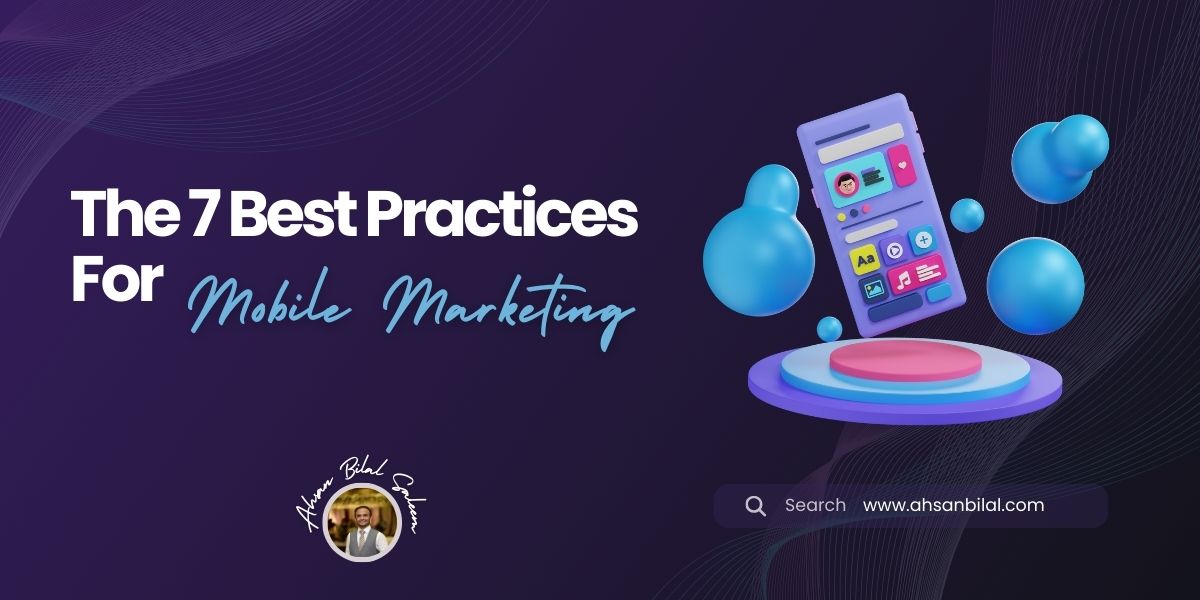The 7 Best Practices For Mobile Marketing
In today’s digital age, mobile marketing has become an essential component of any successful marketing strategy. With the increasing number of smartphone users worldwide, businesses must optimize their marketing efforts for mobile devices to reach and engage their audience effectively. Here are the seven best practices for mobile marketing that can help you maximize your reach and impact.
1. Optimize For Mobile Search
With the majority of internet searches now conducted on mobile devices, optimizing your website and content for mobile search is crucial. This involves ensuring that your website is mobile-friendly, loads quickly, and offers a seamless user experience. Implement responsive design, use larger fonts, and ensure buttons and links are easy to tap. Additionally, focus on mobile-specific SEO strategies, such as optimizing for voice search and local SEO to capture on-the-go consumers.
2. Leverage SMS And Push Notifications
SMS and push notifications are powerful tools for reaching your audience directly on their mobile devices. SMS marketing allows you to send timely and personalized messages to your customers, such as promotions, reminders, or updates. Push notifications can be used to re-engage users with your app, announce new features, or provide personalized offers. However, it’s essential to use these tools judiciously to avoid overwhelming your audience and ensure compliance with privacy regulations.
3. Create Mobile-Friendly Content
Creating content that is easy to consume on mobile devices is vital. Short, concise, and visually appealing content tends to perform better on mobile. Use images, infographics, and videos to capture attention and convey your message quickly. Additionally, consider the layout of your content, ensuring it is easy to scroll through and interact with on smaller screens. Interactive content, such as quizzes or polls, can also enhance user engagement.
4. Focus On Mobile App Marketing
If your business has a mobile app, promoting it effectively is key to driving downloads and user engagement. Streamline your application store posting with important watchwords, convincing portrayals, and excellent screen captures. Energize positive surveys and appraisals to assemble believability. Additionally, consider running app install campaigns on social media platforms and using retargeting ads to re-engage users who have downloaded but not yet used your app extensively.
5. Utilize Location-Based Marketing
Location-based marketing enables you to target users based on their geographic location, providing highly relevant and timely offers. Techniques such as geofencing and beacon technology can help you deliver personalized messages to users when they are near your physical store or specific locations. This can drive foot traffic, boost in-store sales, and enhance the overall customer experience.
6. Enhance User Experience (UX)
A seamless and enjoyable user experience is critical for mobile marketing success. Ensure your website and app are easy to navigate, with clear calls-to-action and minimal loading times. Conduct regular usability testing to identify and address any issues that may hinder user experience. Simplify forms and checkout processes to reduce friction and increase conversions. Remember, a positive UX can lead to higher customer satisfaction and loyalty.
7. Measure And Optimize Performance
Continuously monitoring and analyzing the performance of your mobile marketing efforts is essential for ongoing success. Use analytics tools to track key metrics such as click-through rates, conversion rates, and user engagement. Recognize patterns and examples to comprehend what is working and what needs improvement. A/B testing can help you refine your strategies by comparing different approaches and determining the most effective ones. Regularly updating and optimizing your campaigns based on data-driven insights will ensure sustained success.
Conclusion
Mobile marketing presents unique opportunities and challenges, but by following these best practices, you can create effective and engaging campaigns that resonate with your audience. Optimizing for mobile search, leveraging SMS and push notifications, creating mobile-friendly content, focusing on mobile app marketing, utilizing location-based marketing, enhancing user experience, and measuring performance are all critical components of a successful mobile marketing strategy. By prioritizing these practices, you can stay ahead of the competition and maximize the impact of your mobile marketing efforts.










